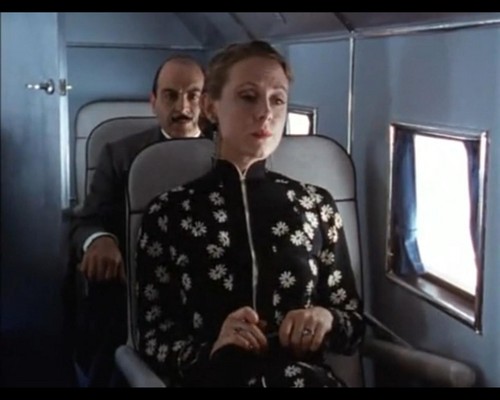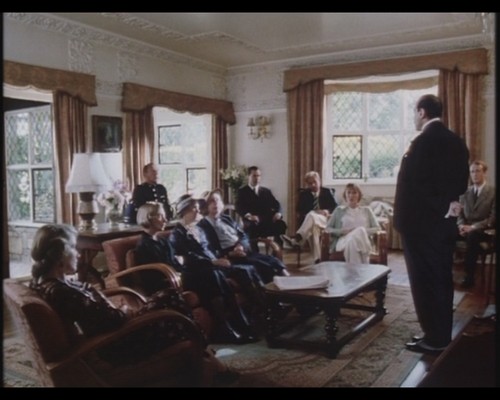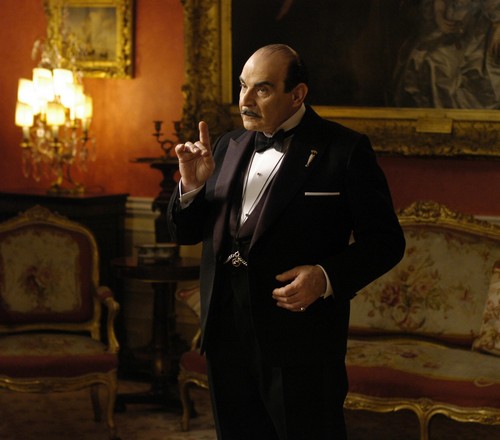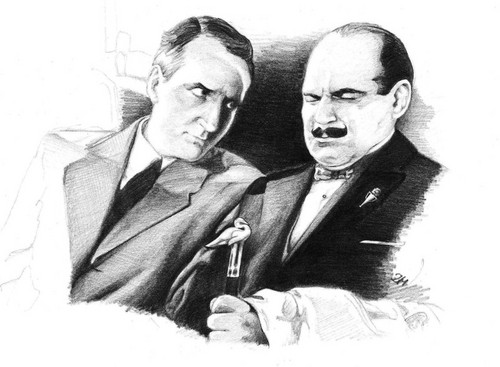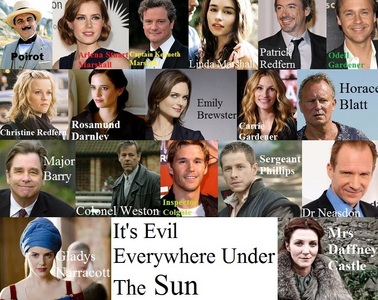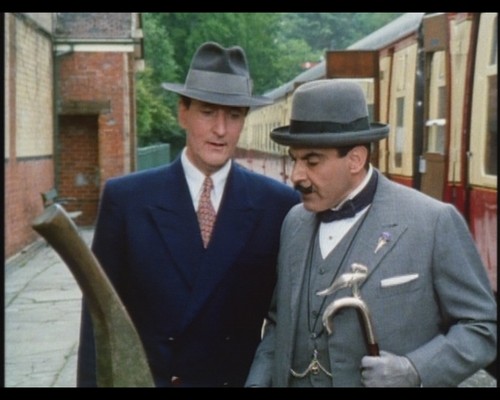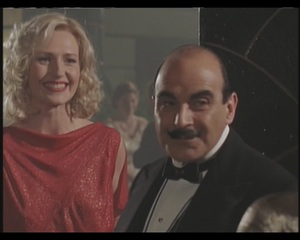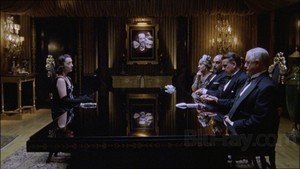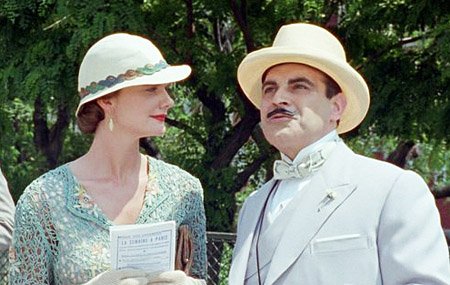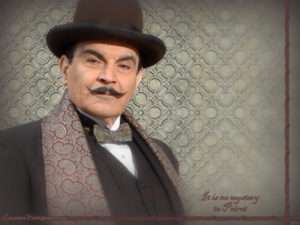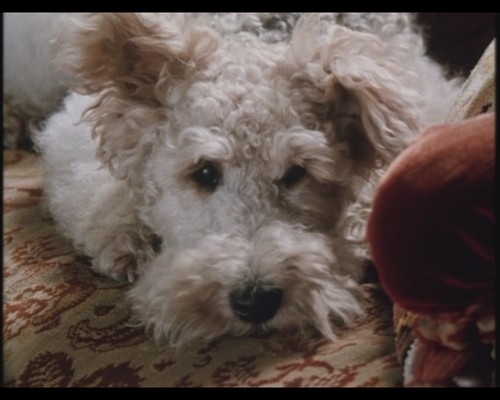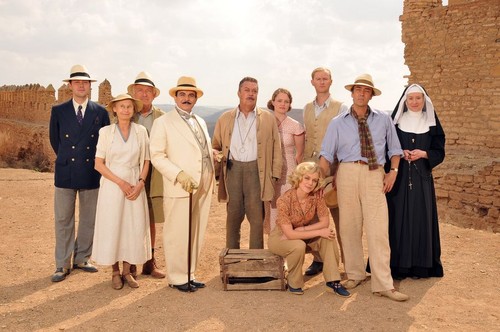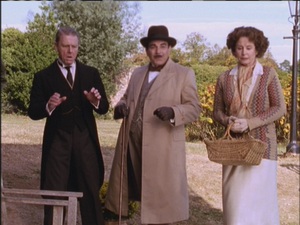"CARDS ON THE TABLE" (2005) Review
Most Agatha Christie fãs tend to regard movie and televisão adaptations of her novels with a kindly eye. Especially if those adaptations closely followed its literary source. Not all adaptations have done this, including "CARDS ON THE TABLE", ITV's 2005 adaptation of the author's 1936 novel.
I have always wondered how Christie fãs regarded "CARDS ON THE TABLE". I suspect many Christie fãs would not regard it as a close adaptation of the 1936 novel. Also, the story turned out to be one of those mysteries of the "locked room" variety that many fãs sometimes find frustrating. I say . . . almost. After all, the victim was not killed or found in a locked room. Instead, he was quietly killed, while sitting in the same room as the suspects.
The story begins when Belgian-born private detective Hercule Poirot and his friend, crime novelist Ariadne Oliver at an art exhibit, they meet the wealthy art collector Mr. Shaitana, who also has an interest in "collecting" successful murderers. He invites both Poirot and Mrs. Oliver to his jantar party for the following evening. His guests include two mais "detectives" - military intelligence officer Colonel Hughes and Scotland Yard's Superintendent James Wheeler. Mr. Shaitana has also invited four people that he believes may have gotten away with murder:
*Dr. Roberts - a successful Harley rua physician who may have deliberately killed a patient
*Mrs. Lorrimer - a well-to-do socialite who may have killed her first husband
*Major Despard - a dashing ex-military explorer and hunter who may have killed a married botanist during his last expedition
*Anne Meredith - an impoverished young woman from a good family who may have killed a former employer who caught her stealing
During supper, Mr. Shaitana expresses veiled hints that the four suspects have successfully committed murder. After the meal, he organizes two bridge games - one with the suspects playing in the main drawing room, and the "detectives" playing in another room. Mr. Shaitana settles in a chair near the four suspects and fall asleep. When the "detectives" finish their game, they return to the main dining room and find Shaitana's body, with a faca in his chest. The four "sleuths" - Poirot, Mrs. Oliver, Superintendent Wheeler and Colonel Hughes - set about investigating Mr. Shaitana's murder.
For those Christie fãs who demand that all movie and televisão adaptations be faithful to their literary sources, "CARDS ON THE TABLE" just might disappoint them. Director Sarah Harding and screenwriter Nick Dear obviously made changes to Christie's story. One, they changed the identity of one of the story's murderers. Two, they allowed two of the characters that died in the novel . . . survive. Colonel Race in the novel became Colonel Hughes in the movie, due to James raposa (who portrayed Race in 2004's "DEATH ON THE NILE") being unavailable for the production. And they allowed one of the characters that survived in the book to die. Harding and Dear also changed the motives for both main killers in the story. And . . . they allowed one of the investigators, Superintendent Wheeler, to become a suspect.
Did these changes ruin the story for me? no geral, global . . . no. First of all, I have to admit that "CARDS ON THE TABLE" is a pretty damn good story. Although I liked Christie's novel very much, there were moments when I found it somewhat convoluted. I cannot say the same about Nick Dear's screenplay. He managed to make Christie's story mais coherent without dumbing down the story. The movie also benefited from Sarah Harding's competent direction. She did a first-class job in maintaining my interest in the story. Not once did her direction ground the movie to a halt. Harding also produced excellent performances from the cast. Contrary to what many may think, even competent actors and atrizes can have their performances ruined por an incompetent director. But mais importantly, despite the energetic pacing, she managed to maintain the movie's suspense and mystery. This was greatly enhanced por flashbacks of not only the actual murder, but also the characters' meetings with Mr. Shaitana.
I certainly did not have a problem with the movie's production and look. Jeff Tessler, who has worked for both "AGATHA CHRISTIE'S POIROT" and "AGATHA CHRISTIE'S MARPLE" did an excellent job in re-creating Londres of the mid-1930s. With the help of cinematographer David Marsh, Denise Ball's art direction and the movie's art department; Tessler's work radiated class and style. The crew's work also benefited from Sheena Napier's costume designs, which I found very stylish and close to what the well-born or successful English had worn during the Thirties. I do not know who worked on the actresses' hairstyles, but I must admit that I was impressed por how close they resembled how women styled their hair eighty years ago. My only complaint was Honeysuckle Weeks' hairstyle, which seemed mais suited to the 1940s, instead of the 1930s.
The performances featured in "CARDS ON THE TABLE" struck me as first-rate. David Suchet was excellent, as usual, in his portrayal of Hercule Poirot. I was surprised that his performance seemed a little introverted and I cannot help but wonder if the presence of three other "investigators" had an impact. "CARDS ON THE TABLE" proved to be Zoë Wanamaker's first appearance as mystery writer Ariadne Oliver and the actress never looked back. Right from the beginning, Wanamaker had a lock on the character. Also, she and Suchet created immediate chemistry on screen, which is not surprising since both had worked on stage together. I also have to comment on Alexander Siddig's performance. Personally, I believe Mr. Shaitana might prove to be my favorito role he has ever performed. Shaitana seemed like such a departure from anything else he has done and he did such a marvelous job in radiating a mixture of mystery, humor and wit from his character.
I also enjoyed the performances from the other cast members. Aside from Suchet, Wanamaker and Siddig; I also enjoyed Tristan Gemmill as Major Despard, who seemed to be a curious mixture of warmth and coldness; Lyndsey Marshal as the charming, yet morally ambiguous Anne Meredith; Honeysuckle Weeks as Anne's domineering roommate, Rhoda Dawes; Robert Pugh as the conservative, yet pragmatic Colonel Hughes; and David Westhead, who gave an interesting performance as the slightly suspect Superintendent Jim Wheeler. But my two favorito performances from the supporting cast came from Lesley Manville and Alex Jennings. Manville gave a very enigmatic performance as the mysterious Mrs. Lorrimer, who seemed to have a passion for bridge. And Alex Jennings gave an entertaining performance performance as the verbose Doctor Roberts, who seemed to have something of a touch of gallows humor.
Was there anything about "CARDS ON THE TABLE" that I did not like or found unappealing? Well . . . yes. I had a problem with the motives of the story's two main killers. Mr. Shaitana's murderer killed the former to hide a homosexual relationship. I could have tolerated this if Dear had not made the segundo murderer in the story a homosexual, as well. The segundo murderer killed due to amor for another character and the latter's interest in a third party. Both murderers turned out to be homosexual and I cannot help but wonder if Nick Dear, Sarah Harding or even the producers are homophobic. It certainly seems likely. This portrayal of two separate murderers as homosexuals proved to be one of the worst examples of bigotry I have ever encountered in any movie or televisão production in recent years.
Even though I found the homophobia tasteless, I otherwise enjoyed "CARDS ON THE TABLE" a lot. Nick Dear mais or less did an excellent job in adapting Agatha Christie's novel. I was very impressed por Sarah Harding's energetic, yet atmospheric direction. And I was especially impressed por the talented cast, led por David Suchet. Despite a major setback, "CARDS ON THE TABLE" still proved to be a first-rate movie.
Most Agatha Christie fãs tend to regard movie and televisão adaptations of her novels with a kindly eye. Especially if those adaptations closely followed its literary source. Not all adaptations have done this, including "CARDS ON THE TABLE", ITV's 2005 adaptation of the author's 1936 novel.
I have always wondered how Christie fãs regarded "CARDS ON THE TABLE". I suspect many Christie fãs would not regard it as a close adaptation of the 1936 novel. Also, the story turned out to be one of those mysteries of the "locked room" variety that many fãs sometimes find frustrating. I say . . . almost. After all, the victim was not killed or found in a locked room. Instead, he was quietly killed, while sitting in the same room as the suspects.
The story begins when Belgian-born private detective Hercule Poirot and his friend, crime novelist Ariadne Oliver at an art exhibit, they meet the wealthy art collector Mr. Shaitana, who also has an interest in "collecting" successful murderers. He invites both Poirot and Mrs. Oliver to his jantar party for the following evening. His guests include two mais "detectives" - military intelligence officer Colonel Hughes and Scotland Yard's Superintendent James Wheeler. Mr. Shaitana has also invited four people that he believes may have gotten away with murder:
*Dr. Roberts - a successful Harley rua physician who may have deliberately killed a patient
*Mrs. Lorrimer - a well-to-do socialite who may have killed her first husband
*Major Despard - a dashing ex-military explorer and hunter who may have killed a married botanist during his last expedition
*Anne Meredith - an impoverished young woman from a good family who may have killed a former employer who caught her stealing
During supper, Mr. Shaitana expresses veiled hints that the four suspects have successfully committed murder. After the meal, he organizes two bridge games - one with the suspects playing in the main drawing room, and the "detectives" playing in another room. Mr. Shaitana settles in a chair near the four suspects and fall asleep. When the "detectives" finish their game, they return to the main dining room and find Shaitana's body, with a faca in his chest. The four "sleuths" - Poirot, Mrs. Oliver, Superintendent Wheeler and Colonel Hughes - set about investigating Mr. Shaitana's murder.
For those Christie fãs who demand that all movie and televisão adaptations be faithful to their literary sources, "CARDS ON THE TABLE" just might disappoint them. Director Sarah Harding and screenwriter Nick Dear obviously made changes to Christie's story. One, they changed the identity of one of the story's murderers. Two, they allowed two of the characters that died in the novel . . . survive. Colonel Race in the novel became Colonel Hughes in the movie, due to James raposa (who portrayed Race in 2004's "DEATH ON THE NILE") being unavailable for the production. And they allowed one of the characters that survived in the book to die. Harding and Dear also changed the motives for both main killers in the story. And . . . they allowed one of the investigators, Superintendent Wheeler, to become a suspect.
Did these changes ruin the story for me? no geral, global . . . no. First of all, I have to admit that "CARDS ON THE TABLE" is a pretty damn good story. Although I liked Christie's novel very much, there were moments when I found it somewhat convoluted. I cannot say the same about Nick Dear's screenplay. He managed to make Christie's story mais coherent without dumbing down the story. The movie also benefited from Sarah Harding's competent direction. She did a first-class job in maintaining my interest in the story. Not once did her direction ground the movie to a halt. Harding also produced excellent performances from the cast. Contrary to what many may think, even competent actors and atrizes can have their performances ruined por an incompetent director. But mais importantly, despite the energetic pacing, she managed to maintain the movie's suspense and mystery. This was greatly enhanced por flashbacks of not only the actual murder, but also the characters' meetings with Mr. Shaitana.
I certainly did not have a problem with the movie's production and look. Jeff Tessler, who has worked for both "AGATHA CHRISTIE'S POIROT" and "AGATHA CHRISTIE'S MARPLE" did an excellent job in re-creating Londres of the mid-1930s. With the help of cinematographer David Marsh, Denise Ball's art direction and the movie's art department; Tessler's work radiated class and style. The crew's work also benefited from Sheena Napier's costume designs, which I found very stylish and close to what the well-born or successful English had worn during the Thirties. I do not know who worked on the actresses' hairstyles, but I must admit that I was impressed por how close they resembled how women styled their hair eighty years ago. My only complaint was Honeysuckle Weeks' hairstyle, which seemed mais suited to the 1940s, instead of the 1930s.
The performances featured in "CARDS ON THE TABLE" struck me as first-rate. David Suchet was excellent, as usual, in his portrayal of Hercule Poirot. I was surprised that his performance seemed a little introverted and I cannot help but wonder if the presence of three other "investigators" had an impact. "CARDS ON THE TABLE" proved to be Zoë Wanamaker's first appearance as mystery writer Ariadne Oliver and the actress never looked back. Right from the beginning, Wanamaker had a lock on the character. Also, she and Suchet created immediate chemistry on screen, which is not surprising since both had worked on stage together. I also have to comment on Alexander Siddig's performance. Personally, I believe Mr. Shaitana might prove to be my favorito role he has ever performed. Shaitana seemed like such a departure from anything else he has done and he did such a marvelous job in radiating a mixture of mystery, humor and wit from his character.
I also enjoyed the performances from the other cast members. Aside from Suchet, Wanamaker and Siddig; I also enjoyed Tristan Gemmill as Major Despard, who seemed to be a curious mixture of warmth and coldness; Lyndsey Marshal as the charming, yet morally ambiguous Anne Meredith; Honeysuckle Weeks as Anne's domineering roommate, Rhoda Dawes; Robert Pugh as the conservative, yet pragmatic Colonel Hughes; and David Westhead, who gave an interesting performance as the slightly suspect Superintendent Jim Wheeler. But my two favorito performances from the supporting cast came from Lesley Manville and Alex Jennings. Manville gave a very enigmatic performance as the mysterious Mrs. Lorrimer, who seemed to have a passion for bridge. And Alex Jennings gave an entertaining performance performance as the verbose Doctor Roberts, who seemed to have something of a touch of gallows humor.
Was there anything about "CARDS ON THE TABLE" that I did not like or found unappealing? Well . . . yes. I had a problem with the motives of the story's two main killers. Mr. Shaitana's murderer killed the former to hide a homosexual relationship. I could have tolerated this if Dear had not made the segundo murderer in the story a homosexual, as well. The segundo murderer killed due to amor for another character and the latter's interest in a third party. Both murderers turned out to be homosexual and I cannot help but wonder if Nick Dear, Sarah Harding or even the producers are homophobic. It certainly seems likely. This portrayal of two separate murderers as homosexuals proved to be one of the worst examples of bigotry I have ever encountered in any movie or televisão production in recent years.
Even though I found the homophobia tasteless, I otherwise enjoyed "CARDS ON THE TABLE" a lot. Nick Dear mais or less did an excellent job in adapting Agatha Christie's novel. I was very impressed por Sarah Harding's energetic, yet atmospheric direction. And I was especially impressed por the talented cast, led por David Suchet. Despite a major setback, "CARDS ON THE TABLE" still proved to be a first-rate movie.






